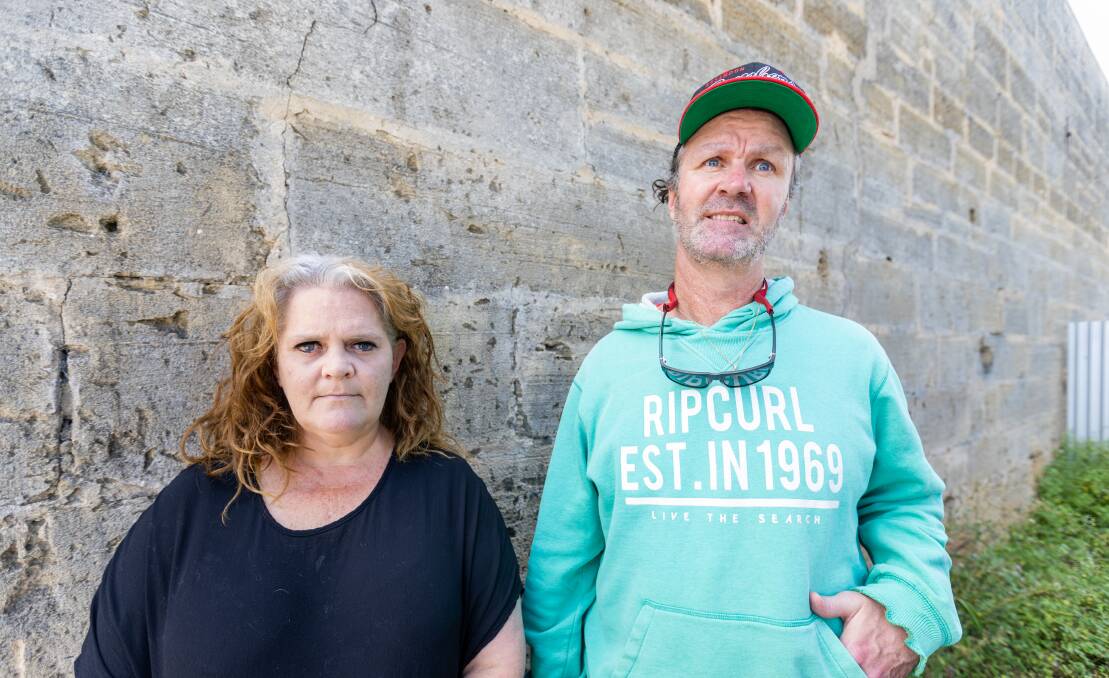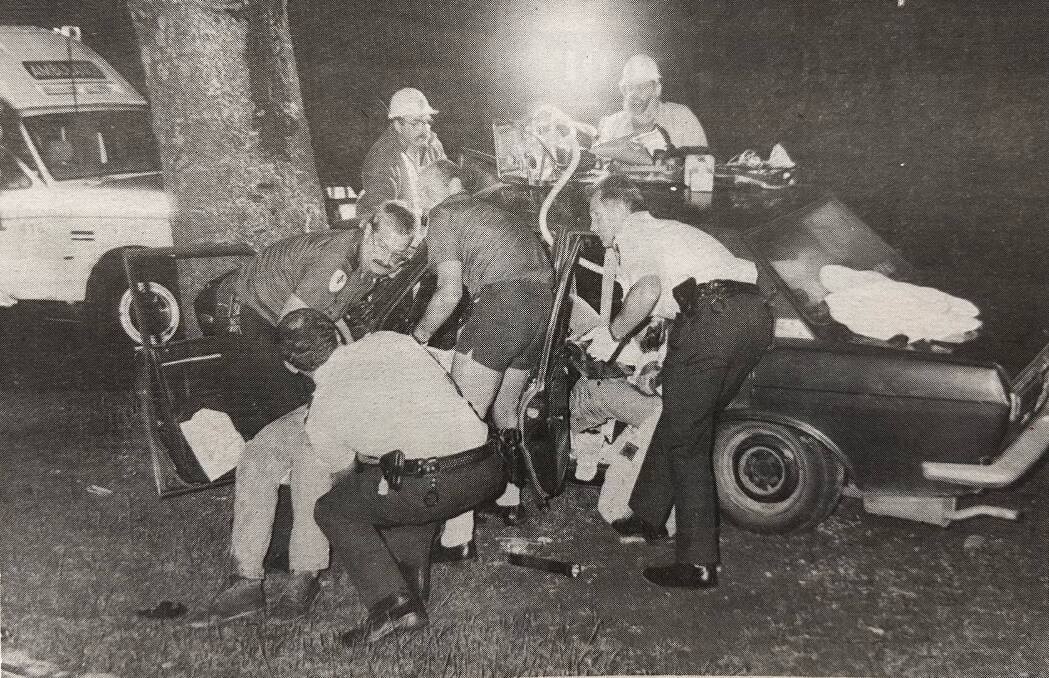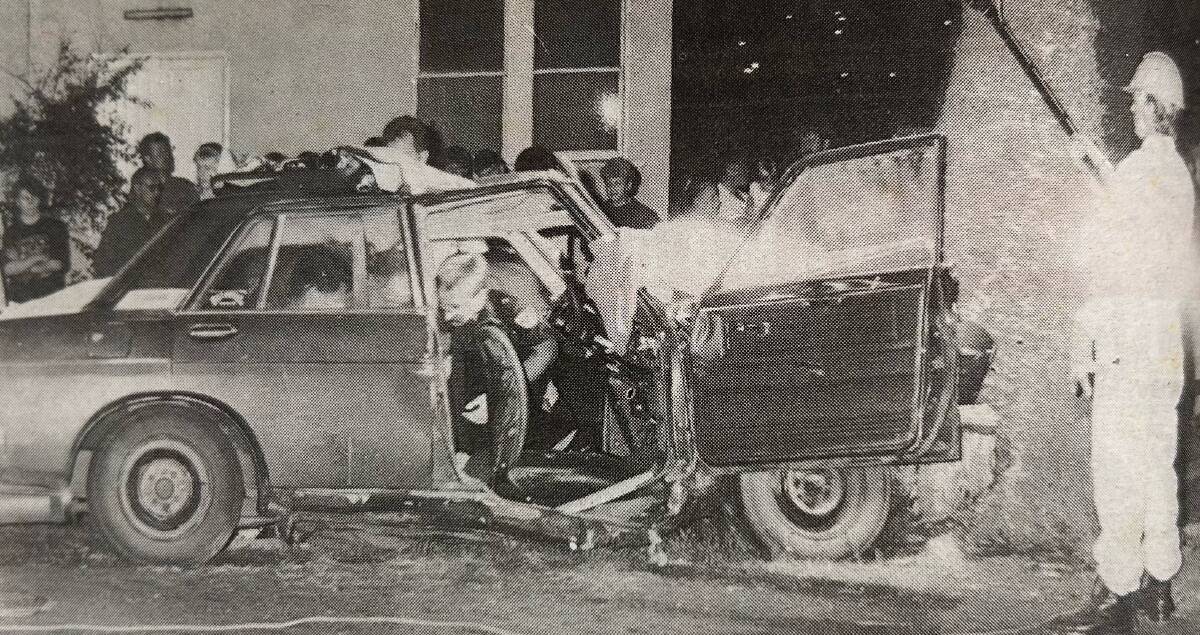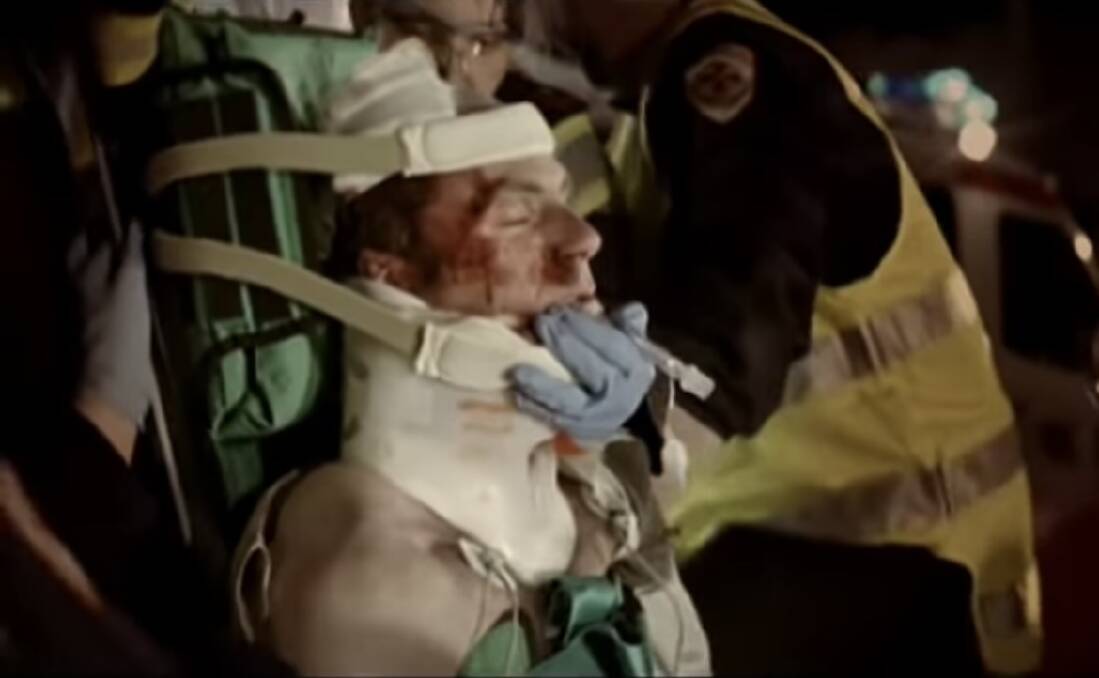
It's been 30 years since the fatal car crash that changed Glenn Heazlewood's life forever, but parts of the night still feel like yesterday.
Subscribe now for unlimited access.
$0/
(min cost $0)
or signup to continue reading
It was November 1993. Mr Heazlewood, known as Gator, was 18 and well-known around Warrnambool as a talented sportsman with ambitions of a career in the AFL.
He was one of six teenagers in a car travelling from the Lady Bay area to Rainbow Bar in Liebig Street for happy hour.
Mr Heazlewood was riding shotgun in the front and his best mate Glenn Denning was driving.
The car slammed into a tree on Pertobe Road, killing Mr Denning and throwing Mr Heazlewood through the front windscreen.
Mr Heazlewood can vividly remember the intense fear he felt as he saw the car approaching the tree.
The next thing he recalls is being resuscitated in an ambulance.
"Back then the culture was 'if you drink and drive you're a bloody idiot but if you make it home you're a f****** legend'," Mr Heazlewood told The Standard.
He didn't make it home that night.
Instead, he missed the Hoodoo Gurus concert he planned to go to and woke up in a Melbourne hospital after 28 days in a coma.

Mr Heazlewood spent months in a head injury rehabilitation centre.
He taught himself how to walk and talk again but still lives with a brain injury and physical scars.
It's not the first time Mr Heazlewood has told his story - and it won't be the last.
He will soon be a volunteer speaker at Warrnambool's road trauma awareness seminar, which provides education as a component of sentencing for people with traffic offences.
He tells his story with candour but also a lot of humour.
"I've learnt how to laugh because I didn't have another choice," he said.
Mr Heazlewood said if he could help just one person from making a fatal mistake behind the wheel of a car, he'd be happy.
"My message is don't give others the power over your life," he said.
"And look after your own."
It's a message he believes could have changed the outcome of that crash 30 years ago if he'd heard it at the time. The road trauma awareness seminar is hosted by Amber Community and facilitated in Warrnambool by Mr Heazlewood's long-time friend Rae Currie.
Ms Currie has experienced road trauma from all angles.
She's seen graphic collision scenes as a State Emergency Service volunteer, heard from those impacted through the facilitation of the program, and watched her son grow up without a father after a fatal crash nearly 30 years ago.
"I've seen first-hand what road trauma does to people," Ms Currie said.

She said Tim, the father of her son Rhys, died during a motorbike ride with friends in Adelaide in 1995.
"Rhys was almost four," she said.
"Since then he's missed out on having his dad at all of his milestones. He has achieved some magnificent things that he would have liked to have shared with his father, but couldn't."
Ms Currie joined the Warrnambool SES 13 years ago and became the facilitator of Warrnambool's road trauma support services in January last year.
She said people believed road trauma wouldn't affect them, "until it does".
"We no longer call them accidents, they're crashes, because they could have been avoided," she said.
"Motorists think they're invincible but just one choice can bring about consequences that affect our community for many, many years to come."
Ms Currie said it was disheartening to see the region's recent run of fatalities on the roads.
Six people have died so far this year - three times the number recorded in the same period in 2022.
There were five lives lost in the south-west in seven weeks, near Hamilton, Tower Hill, Timboon, Coleraine and Mortlake.
Then on Wednesday a Warrnambool man in his 60s died after his truck rolled at Garvoc.
Last year five people died between June and November in four separate collisions at Cobden, Dixie, Berrybank and Dartmoor. The victims were aged between 16 and 33.
Ms Currie said when attending a crash scene with the SES, her first thought was always "this should just not have happened".
Police have this year repeatedly urged drivers to take care, slow down and get a ride home if under the influence of drugs and/or alcohol.
Ms Currie said police were doing a "wonderful job" but she feared their pleas were falling on deaf ears.
She said she was eager to connect with high-risk groups, including schools and sporting clubs, but limited funds made it difficult to expand not-for-profit road trauma support services across the region.
Ms Currie and Mr Heazlewood urged the state government to fund more driver education programs for those at risk, particularly in schools, before or at the time of young drivers obtaining their licence.
The Standard asked the state's Department of Education what programs were offered to south-west students.
A response was not received by deadline.
As the 30th anniversary of the fatal crash on Pertobe Road looms, Ms Currie recalled attending Mr Denning's funeral.
It was something Mr Heazlewood sadly missed as he was still recovering in hospital.
Ms Currie said the R.E.M. song Everybody Hurts played at the service. It's the same song that featured 17 years later in a hard-hitting retrospective video montage for the Transport Accident Commission's (TAC) 20th anniversary.
"I still get chills when I hear that song," Ms Currie said.

TAC chief executive officer Joe Calafiore said it was critical to talk to young people about road risks and enable them to get the practice they need, in all conditions.
"Sadly, young drivers are more vulnerable on the roads and over-represented in deaths and serious injuries," he said.
"The TAC has and continues to invest heavily in road safety education programs, campaigns and partnerships aimed at reducing road trauma in young people, and empowering them with the knowledge, skills, and confidence to be safe on the roads.
"The TAC will keep campaigning and investing in initiatives to keep Victorians safe on the roads, but we all need to take ownership, look at the way we drive and heed the message to drive safely."
In December, the TAC re-launched its campaign 'The Lucky Ones Get Caught', which ran until the end of January and encouraged people to reflect on their own driving behaviour and consider the impact to themselves and others.
The campaign addressed key road safety issues, such as speed and driver distraction, and highlighted the critical role Victoria Police play in road trauma prevention. It was also amplified by confronting replica crashed-car scenes set up in Melbourne and Ballarat.
Since then, and in response to increasing number of road deaths this year, the TAC is running a campaign targeting speed and drug-driving across the state - and is highly visible on billboards, digital, press and radio, across metro Melbourne and regional Victoria. In April, the advertising will focus on distractions.
Ms Currie said she hoped drivers heeded the message because road trauma was isolating to those who experienced it.
"It doesn't go away," she said. "You're forever sitting there at a birthday, at Christmas, and there's always that empty seat. Someone who dies in a crash is never forgotten and the trauma of that lives with their community forever."
IN OTHER NEWS
Our journalists work hard to provide local, up-to-date news to the community. This is how you can access our trusted content:
- Bookmark https://www.standard.net.au/
- Make sure you are signed up for our breaking and regular headlines and newsletters
- Follow us on Facebook, Twitter, Instagram and LinkedIn
- Tap here to open our Google News page
- Join our Courts and Crime Facebook group and our dedicated Sport Facebook group
- Subscribe


